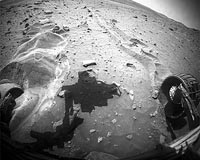 |
Pasadena CA (JPL) Mar 12, 2010 Opportunity has finished its circumnavigation campaign around "Concepcion" crater. Numerous targeted images were taken of rocks around the crater but no new rock targets were chosen to be analyzed using the in-situ (contact) instruments of the rover's robotic arm (IDD). During the last leg around the crater on Sol 2172 (March 4, 2010), the third and final checkout for the AEGIS automated targeting software was successfully run. For this checkout, AEGIS analyzed a Navigation Camera (NavCam) image and searched for "cobbles" using a profile that prioritized rocks based on rock size and brightness. The top target found was an excellent example of a cobble. AEGIS then took a high quality, quarter-frame, 13-filter, Panoramic Camera (PanCam) image of this target. Opportunity drove away from Concepcion crater on Sol 2177 (March 9, 2010), and has driven about 130 meters (427 feet). Opportunity has now returned to the original path to Endeavour crater. As of Sol 2177 (March 9, 2010), the solar array energy production was 278 watt-hours with an atmospheric opacity (tau) of 0.446 and a dust factor of 0.504. Total odometry is 19,492.84 meters (12.11 miles).
Spirit Has A Light Winter Schedule Winter operations have begun with the rover, which consists of a single 7-sol plan each week. The 7-sol plan contains a single X-band uplink and a single Ultra-High Frequency (UHF) downlink. The activity on each sol consists simply of a brief wakeup, an atmospheric opacity (tau) measurement, and then a shutdown for the rest of the day and night. The last downlink from the rover was on Sol 2195 (March 7, 2010). The next downlink from the rover is not scheduled yet, but expected to be sequenced for this coming weekend. Energy production by the solar arrays has just been matching energy consumption by the rover. However, this will diverge as solar array energy decreases as the sun descends lower in the sky and as rover energy needs increase from heaters as environmental temperatures drop. The risk of a low-power fault (where batteries are drawn down below a specific cell voltage threshold) increases each sol going forward. As of Sol 2195 (March 7, 2010), the rover solar array energy production was to 151 watt-hours with an atmospheric opacity (tau) of 0.339 (measured on Sol 2193, March 5, 2010) and a dust factor of 0.506 (from Sol 2193 data). Total odometry is unchanged at 7,730.50 meters (4.80 miles).
Share This Article With Planet Earth
Related Links Mars Rovers at JPL Mars Rovers at Cornell Mars News and Information at MarsDaily.com Mars News and Information at MarsDaily.com Lunar Dreams and more
 Spirit Set For Another Cold Quiet Winter
Spirit Set For Another Cold Quiet WinterPasadena CA (JPL) Mar 05, 2010 Spirit is in her winter position, still embedded in the area called "Troy" on the west side of Home Plate. Efforts are nearing completion to prepare the rover for winter. Because of the low power levels, multi-sol plans are being developed with reduced communication activity to save energy. Only one or two planning cycles occur each week. These plans have a single uplink to the rover ... read more |
|
| The content herein, unless otherwise known to be public domain, are Copyright 1995-2010 - SpaceDaily. AFP and UPI Wire Stories are copyright Agence France-Presse and United Press International. ESA Portal Reports are copyright European Space Agency. All NASA sourced material is public domain. Additional copyrights may apply in whole or part to other bona fide parties. Advertising does not imply endorsement,agreement or approval of any opinions, statements or information provided by SpaceDaily on any Web page published or hosted by SpaceDaily. Privacy Statement |